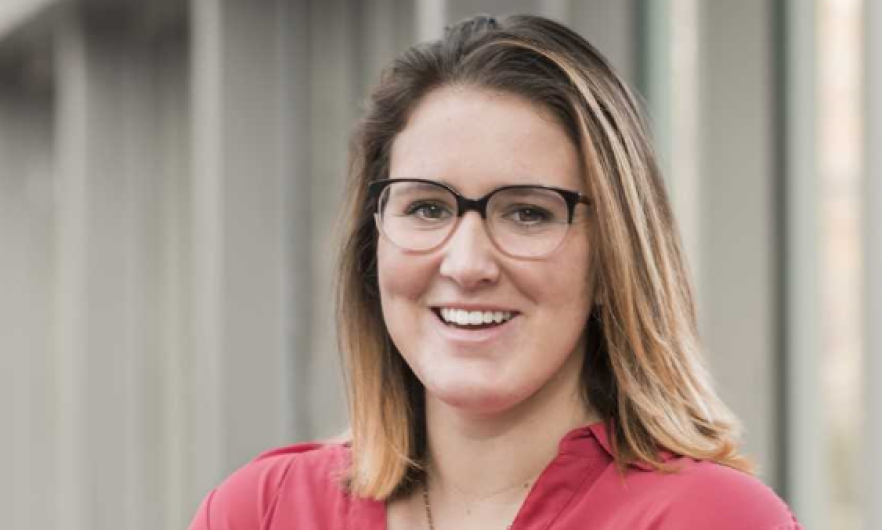Alumni Spotlight: Delaney McGuire

MSPH grad, Delaney McGuire, talks jazz, networking, and landing her consulting role at Deloitte.
Hometown: Lafayette, California
Graduation year: Class of 2019
Program: MSPH in Health Education & Health Communication
Fun fact: “I play violin, viola, and bass primarily. Jazz is my favorite type of music to play, and my cat is actually named Jazz.”
Q: What first got you interested in public health?
A: Growing up, I swam. I also happened to grow up in the middle of a California draught. Because of that experience, I became cognizant that folks around the world don’t always have fresh and clean water – water to drink, to clean, to cook with – let alone to play in like I did. It was a huge privilege I was very thankful for.
That inspired my decision to attend Tulane for undergrad and my interest in working to improve water conditions and health around the world. I started as an engineering major, but after learning more about public health at Tulane, I changed my major and was all in on public health. I was just so excited to see all the different avenues that public health can take you. I’m a very service- oriented, mission-driven person, and I’ve found so many likeminded people and communities in this field, and that continues to push my passion for public health.
Q: What led you to HBS?
A: The work that I had done after undergrad, working as an intern and fellow at the CDC’s Office of the Associate Director for Communication, centered on health communications, so I focused on applying to behavioral health and health communications programs.
Your degree cohort really becomes an incredible network. I think part of what’s cool about HBS is that they tend to have smaller cohorts, which means you can become incredibly close with your cohort – these people that really become your network, your friends, your family. We all came from different places around the world, so it was really great to share experiences and listen to folks' perspectives.
Q: When you reflect on your time at JHSPH, what’s a class that stands out?
A: I took Doug Storey’s Health Communication Programs class. We had to plan, develop, implement, evaluate, and present an entire health communications campaign. I was able to directly apply those skills that I learned in that class to my practicum at the CDC’s Office on Smoking and Health, where I assisted with the Tips from Former Smokers campaign.
Q: Where are you working now? What do you like most about your role?
A: I’m a consultant with the government client service support side of Deloitte. The projects that I’ve been placed on all have aspects of impact that matters – that’s Deloitte’s focus. There’s always a real strong purpose and drive behind everything we do. So, it’s amazing to work with people who feel that way.
Q: What does a typical day in your position look like?
A: A typical day for me? I wouldn’t necessarily say I have one. There’s a lot that goes on with meeting with my Deloitte team – strategizing and critical thinking, applying logic to recommend good decisions and paths forward for your clients. Meeting with our clients is the other half of our job, helping them to address some really complicated challenges. So, every day is different, which is part of the fun. I’m using my brain 110 percent, and I’ve been able grow and learn constantly.
Q: What are some new projects happening at your workplace?
A: Deloitte is supporting a lot of its clients right now through all of these COVID-related transitions – everything from human capital changes to technology changes. There have been so many areas impacted by COVID, so they’re trying to support clients as much as possible.
Q: How did you land your current role at Deloitte?
A: When I was looking for work after graduate school, I really just networked. I talked with folks I knew really well and worked with in the past. I talked with anyone I could think of who might be looking for new hires. That’s how I got connected with someone at Deloitte. From there, I went through the interview process. The whole process definitely took a long time because of the time of year and packed schedules on both sides. That’s one of the caveats with networking. Sometimes things happen really quickly, and sometimes they can take years to come to fruition.
Q: What advice would you have for students searching for public health opportunities and looking to build their networks?
A: At Bloomberg, I took a course on emergency preparedness and response. We had a guest speaker several times a week, and each time I would stay after class, talk with that guest speaker, and ask them to coffee. I had coffee with, I think, nine out of ten of the speakers. At that time, I wasn’t necessarily networking in order to find a job but to learn more about a topic and just soak up those experts’ knowledge. So, over the years, networking has just become one of the things that I’ve started to work into a regular part of my life.
Think of everything you do to get ready for a test. You review things. You meet with friends and have a study group. That’s how I’ve learned to think of the job search process. You prepare. You look for ways to improve yourself – and part of that is really through networking.
This interview has been edited and compressed.
